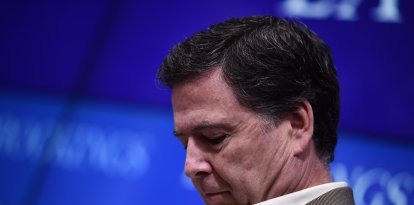The Democratic Party has been fortifying Iran for decades
In seeking to strike deals with Tehran, with the help of lobbyist organizations of the Iranian regime, successive Democratic administrations have not only failed to moderate the Islamist government, but have strengthened its global influence and increased the danger it poses to the United States and the world.

Protesters burn an American flag in Tehran, Iran.
Successive Democratic administrations have tried for decades to reach an agreement with Iran to appease its regime, which since 1984 has been funding Islamic terrorism. However, the efforts of these governments have not only failed to achieve their goal, but resulted in Tehran getting even stronger, representing a serious danger to the world.
Researcher Kenneth R. Timmerman points out in his book "The Iran House: Tales of Revolution, Persecution, War, and Intrigue," recently published, that Hooshang Amirahmadi, an Iranian-American ex-communist academic with ties to the regime, was one of the first to engage in pro-Tehran lobbying with his organization, the American Iranian Congress (AIC).
In an article recently published in The New York Post, it is noted that Timmerman mentioned in his book that in the mid-1990s, AIC was funded by the energy company Conoco in order to convince President Bill Clinton to allow the company to develop huge oil and gas fields in Iran.
The author adds that despite the fact that U.S. trade sanctions against Tehran had been in place since the Iran hostage crisis (1979-1981), during which Iranian students held dozens of U.S. diplomats and citizens captive for 444 days, the AIC and other like-minded organizations continued to lobby for Washington to do business with Tehran.
In those years, Clinton attempted to negotiate a secret deal with Tehran before the 2000 election. Timmerman argues that if that agreement had succeeded, sanctions would have been lifted and U.S. trade with Iran reopened. Also, Washington would have given Tehran billions of dollars in repayments.
While the deal failed, the Iranians continued to try to influence the United States through the Democrats.
Hooshang Amirahmadi's dark history
The Iran Lobby website claims that Amirahmadi has been publicly defending the Iranian regime for decades.
In 1994, after the bombing by Iran and Hezbollah of the Jewish organization Asociación Mutual Israelita Argentina (AMIA) in Buenos Aires, Argentina, in which 85 people were killed, Amirahmadi criticized Warren Christopher, then U.S. secretary of state, for calling the Islamic Republic an "outlaw nation" and stating that "groups like Hezbollah that wreak havoc and bloodshed must be defeated. And Hezbollah’s patron, Iran, must be contained."
Amirahmadi responded, "A catch phrase of the nature of ‘outlaw nation’ smacks of a discredited ‘do as we say’ cold-war brand of international policy, not the true diplomacy required in these sensitive times when the United States is, or should be, an equal player on the global stage."
Iran Lobby further notes that the AIC often downplays the threat posed by the Iranian regime. It adds that Amirahmadi suggests that all foreign policy conflicts between the United States and Iran can be resolved through dialogue.
Amirahmadi further denies Iran's support for terrorism, notes Iran Lobby.
Democratic collaboration with Tehran during the George W. Bush administration
During the term of Republican George W. Bush, Iranian lobbyist groups continued to try to reach an agreement with the United States through their contacts with Democrats.
Timmerman explains in his book that in 2002, an Iranian doctor named Sadegh Namazi-Khah managed to raise $30,000 in California for the reelection campaign of Joe Biden, who was then a senator and chaired the Senate Foreign Relations Committee.
"The senator said Iran always wanted to be a U.S. ally and have good relations with the United States," commented one fundraising participant.
That same year, The Washington Times published an article titled "Iran and Its Apologists," criticizing the ties between the Iranian regime and the Democrats. "Mounting evidence that Tehran is shielding hundreds of fleeing al Qaeda terrorists and is working to destroy what’s left of the Arab-Israeli peace process have made it increasingly difficult to push for 'closer' U.S.-Iranian ties with a straight face. Nevertheless, a number of high-powered folks in Washington seem determined to try," the newspaper said at the time. It also mentioned the intervention of the AIC and the $30,000 raised by Namazi-Khah, whom it described as a Los Angeles activist pushing for a softer U.S. policy toward Iran.
The U.S. newspaper added that in private discussions at that fundraiser, Biden expressed outright condemnation of Bush's statements about the "axis of evil."
John Kerry's aid to Iran
Timmerman points out in his book that former Secretary of State John Kerry was another important supporter of the Iranian regime.
Kerry, the author remarks, helped Tehran join the World Trade Organization and lift visa restrictions that had been imposed on Iranians after 9/11.
Timmerman adds that Kerry's daughter Vanessa married an Iranian-American and that their honeymoon was spent in Iran when her father was serving as secretary of state under the Obama administration, shortly before the secret talks that resulted in the controversial Joint Comprehensive Plan of Action, the nuclear deal between world powers and Iran, began in 2015.
The Trump administration withdrew the United States from that agreement in 2018.
At the time, the then-president harshly criticized the deal and claimed that even if Iran had complied with all the commitments stipulated in the treaty, the Iranian regime would have been on the verge of obtaining nuclear weapons.
The rise of NIAC, another pro-Iranian lobbying organization
Timmerman notes that Amirahmadi was overtaken by a former aide named Trita Parsi, who emigrated to the United States from Sweden in 2001 and founded the National Iranian American Council (NIAC) in 2002.
In contrast to the AIC, which was funded mainly by Big Oil, NIAC obtained contributions from left-wing organizations, such as the Ploughsares Fund, George Soros' Open Society Institute, and the Tides Foundation, partially funded by Teresa Heinz, the wife of John Kerry.
The organization Influence Watch describes NIAC on its website as a group that claims to advocate nonpartisan action on behalf of the Iranian-American community on domestic and foreign policy issues. However, Influence Watch adds, NIAC promotes a number of leftist policy positions, including an end to all sanctions on the Iranian regime, and supports radical leftist politicians.
NIAC has faced several accusations of undue alignment with the repressive regime of the Islamic Republic of Iran, per Influence Watch. Moreover, the pro-Iranian organization has long expressed sympathy for the Iranian regime, urging the United States not to respond to the Tehran-backed dictatorship of Bashar al-Assad in Syria, even after his regime used chemical weapons against civilians during the Syrian civil war.
In addition, NIAC officials have been photographed with Iranian diplomats, and its founder and former chairman Trita Parsi was found to have encouraged Iran's former representative to the United Nations to meet with Democrats in Congress.
Timmerman points out that NIAC members have been very adept at reminding members of Congress about the suffering caused to Iranian civilians by U.S. sanctions.
Indeed, Timmerman stresses that Trita Parsi became a semi-official member of the Iranian regime's negotiating team during the talks that led to the 2015 nuclear deal.
Then, the State Department during the Obama administration sent Parsi to give a series of lectures in Saudi Arabia and hired Sahar Nowrouzzadeh, a former NIAC employee, as director of national security for Iran.
The NIAC narrative, based on the idea that U.S. sanctions primarily harm Iranian civilians and that Tehran can abandon its program to obtain nuclear weaponry and may even be a better ally for the United States than Saudi Arabia, has penetrated Biden and Obama, Timmerman argues.
However, Iran has not abandoned its goal of obtaining nuclear weapons and continues to fund the Syrian regime and its own terrorist proxies, such as Hezbollah in Lebanon, the Houthis in Yemen, and Hamas in Gaza, among others.
The shady relationship between Democrats and Tehran also includes Kamala Harris
Despite the Oct. 7 massacre and evidence that Iran has yielded on absolutely nothing, there seems to have been no change for Democrats regarding their relationship with the Iranian regime, and this dark link between the Democratic Party and Tehran also includes Vice President Kamala Harris.
Phillip Gordon, a NIAC supporter who advised Kerry during negotiations with Iran to reach the nuclear deal, became Harris's national security advisor in 2021 and could become secretary of state should the Democratic nominee win in the November election.
In 2016, the NIAC website published an article noting that Gordon, who also served as a senior advisor to the president under the Obama administration and at the time was a campaign advisor to Hillary Clinton, stated during an NIAC conference that there were opportunities for more constructive relations between the United States and Iran after the nuclear deal was reached.
Timmerman notes that Gordon also promoted rapprochement between Washington and Tehran in three op-eds written with Ariane Tabatabai, a former senior Defense Department official.
In a letter to Harris, Senator Tom Cotton and Rep. Elise Stefanik, both Republicans, said Gordon and Tabatabai promoted the interests of the Iranian regime in their writing.
The lawmakers added that Tabatabai was even involved in an operation by the Iranian regime to expand its soft power in the United States. They further remarked that Gordon was closely involved with NIAC.
Timmerman concludes that all signs point to a Harris presidency continuing this dangerous pursuit of cooperation, which Iran will use to extort the United States while continuing to attack it.

























